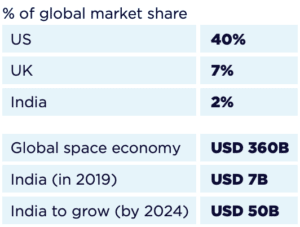Reforming Space Sector in India
< General Studies Home Page
Contents
Need of Reforms:
- Low Global Space Economy Share: Global space economy is currently valued at about USD 360 Billion. India, despite being among the few space-faring nations of the world, has only 2% of the global share.



Global % of space market share
- Negligible contribution of private sector: In major space faring nations, over the last 2 decades several major private players have emerged who are bringing efficiency and innovation. For e.g. SPACEX, Virgin Galactic, and Blue Origin in USA. However, in India the role of space sector has been minimal, either being vendors or suppliers to the ISRO programs.
Guiding Principles of Reform:
- Enables and Promote Private Players – Level Playing Field, Favorable Regulatory Environment.
- Open Up ISRO Infrastructure and Technologies – The reform also aims to make national space infrastructure developed over the years, available for use by private industry through business-friendly mechanism.
- Public sector to focus on R&D – Let business entities focus on manufacturing and commercial activities. Previously developed and already mature technologies/platforms would be transferred to the private sector through Transfer of Technology mechanism.
- Demand Driven Approach for Development of Space Assets: Optimize the utilization of space assets such as satellites and launch capacity by determining accountability amongst various stakeholders. Creation of new asset should be contingent on confirmation of demand from user agencies/ entities.
- Inspire Youngsters and Dreamers: Develop world class learning facilities and space museums where youngsters can learn basics of space technology and carry out research in topics of interest.
Implementation Strategy:
- Opening up of Space Sector: A gamut of space activities has been opened up for private participation, including inter alia:
- Building of launch vehicles and satellites
- Sharing of ISRO facilities
- Establishment of facilities in DOS premises
- Launch campaign and launch.
- Space based services
- Setting up of IN-SPACe (Indian National Space Promotion and Authorization Centre)
- It is a single window, independent, nodal agency.
- Its main mandate is to promote and enhance the role of private industry players in the space sector through hand holding, support, and by providing them with a level playing field.
- Provide a stable regulatory and policy environment: The reforms have strengthened the policy making capacity of Department of Space and an exercise has been initiated to create new business friendly policy frameworks in areas like remote sensing, satellite communication, and launch policies.
- Enhancing the Role of New Space India Limited (NSIL): The reforms have authorized the public sector NSIL to act as a public sector aggregator for both demand and supply of space assets.
- Transfer of Technologies from Public to Private Sector: NSIL has been given the role of transferring technologies/platforms from the public to the private sector. Platforms such as PSLV and SSLV have been identified for transfer of technology to the private sector in the near future.
- Announcements of future opportunities for private sector: The reforms have tasked ISRO with identifying and announcing the future opportunities in selected science and exploration missions for private sector participation
Impact of Reforms:
- Private sector, industry, academia, and startups have warmly welcomed the space sector reforms and the new IN-SPACE mechanism.
- More than 40 proposals from startups, MSMEs, and industries have already been received for future consideration by IN-SPACe, illustrating the overwhelming response to the system.
- Increased Investment – Following these reforms, several Indian space sector startups have been able to raise venture capital for their planned project. A new Indian Space Association has been created to function as the advisory and advocacy group for the space industry.
- 6 space technology incubation centres are now operational at Agartala, Trichy, Jalandhar, Rourkela, Nagpur, and Bhopal.
In Feb 2021, NSIL conducted its first commercial launch. The launch put 19 satellites into orbit on the PSLV C-51 launch vehicle, including 4 satellites through IN-SPACe.
